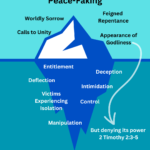“I tell you that in the same way, there will be more joy in heaven over one sinner who repents than over ninety-nine righteous people who have no need of repentance.” – Luke 15:7 (NASB).

In a previous post, we discussed how oppressors use other people’s sensitive consciences to manipulate them. The great irony of this is that while controlling others, the oppressor himself feels no shame for his own abominations. When called to repent, an oppressor often doubles down on his own rightness, seeing himself as a righteous person with no need to repent, or exhibits the “repentance” of King Saul.
The Seared Conscience of An Unrepentant Abuser
What does the seared conscience of an abuser look like? This person does not feel proper guilt or shame for his abominations as his conscience has been seared, as with a hot iron. After ignoring his conscience repeatedly over and over, his conscience has become calloused and no longer functions to warn him that he is in danger. This searing doesn’t happen overnight, rather it happens after he has suppressed his conscience time and time again.
In 1 Timothy 4:2, the Apostle Paul describes those with seared consciences as “hypocritical liars.” As hypocrites, they appear to be righteous but their wickedness is concealed. They are characterized by lies and deception. Let’s look at each of these elements more closely.
Hypocrisy
Hypocrites do not want to be exposed. Like leaven used for baking, hypocrisy is not immediately visible, but can be detected by its leavening effects. Jesus cautions us to be aware of the leaven of Pharisees and to watch out for false teachers who come in sheep’s clothing but inwardly are ferocious wolves. In his kindness to us, Jesus wants us to be equipped when we encounter those who would do us harm. He tells us we will know them by their fruit, not just the outward presentation of good works done in his name. (Matthew 7:6, 7:15-23, 10:16, Luke 12:1-4.)
Hypocrites with seared consciences say one thing but do another. It’s do as I say, but not as I do. They will look you straight in the eye and tell you not to violate God’s law while at the very same time, violating the very same law they proclaim. They may preach excellent sermons on not committing adultery while hiding a secret mistress at the very same time they spout God’s law. They may accuse you of slander for your truth-telling while bearing false witness with lies to defame you.
Oppressive leaders may appear to know and love the law of God, but they are actually lawless and spiritually blind. Jesus calls them “blind guides” since they are unable to see themselves clearly. It is a sad situation indeed. Outwardly they appear clean but inside they are full of greed and self-indulgence. They may hide behind good works and talent, but the reality is that they are workers of lawlessness. (Romans 2:19-24, Matthew 23:24-27, 23:27-28, John 9:40-41).
Hypocrisy and legalism are related cousins. The law of God becomes a means to an end: to prop up a hypocrite’s righteous persona and to gain power and control over others. Oppressors will pick and choose which laws of God they follow themselves while placing burdens and yokes on others. It’s “rules for thee but not for me.” In this way, oppressors abuse both people and the law of God. Oppressors reveal that they really love themselves, not God’s law. They may tithe, preach a good sermon, or pray in public very well, but neglect the weightier matters of the law such as justice, mercy, and faith. (Matthew 6:5-8, 23:4, 23:23.)
If you look closely, religious oppressors with seared consciences do not actually fear God. They rule with fear and their traditions carry more weight than Scripture. They are highly insecure and love the praise of men more than praise from God. Experts at smooth talk and flattery, they will strive to gain and keep their power to feed their own appetites. They are insincere, treacherous, and disingenuous. (John 9:22, 1 Samuel 2:16, Matthew 23:3-5. Romans 16:18, 2 Timothy 3:2-5.)
Religious leaders with seared consciences show that they do not know God. They do not see the law of God as a law that gives true liberty. For where the Spirit of the Lord is, there is freedom. The fruit of their lives shows they sin willfully and deliberately. Scripture warns us that those refusing to repent even after being confronted with the truth may find repentance to be elusive. Perhaps this is why C.S. Lewis said that of all bad men, religious bad men are the worst. (James 2:12, 2 Corinthians 3:17, 1 Samuel 2:12, Hebrews 10:26,31.)
Lies and Deception
An oppressor with a seared conscience maintains his power through lies and deception. It is often his position of power that helps him live deceptively and get away with it. Diane Langberg states:
Deception can easily lie below the surface of a high position, great theological knowledge, stunning verbal skills, and excellent performance. As a matter of fact, those are power tools that allow people to live deceptively AND hide the fact that they are doing so
— Diane Langberg, PhD (@DianeLangberg) October 16, 2024
Because an oppressor’s conscience is seared, he can lie with impunity. This is why oppressors can sound so convincing. He begins believing his own lies. He is both self-deceived and a deceiver of others. Wicked oppressors refuse to believe that they have harmed anyone else. They view themselves as the true victims and treat others with contempt. (2 Timothy 3:12-13, James 1:22, Luke 18:9.)
When a wicked person is in a position of leadership or power, the amount of harm they can do increases greatly. Wolves in sheep’s clothing continue to devour sheep while masquerading as shepherds. Consider the great damage that can be done when a church leader misappropriates the voice of God and accuses others of sin, demanding that they ‘give glory to God.’ In so doing, they sound more like the accuser of the brethren, than Christ our advocate. (John 9:24,34.)
Abusers will use their power to avoid accountability. They will scapegoat others to avoid negative attention on themselves. When they can not control you, they will cast you out. Judith Herman describes an abuser’s tactics this way:
“In order to escape accountability for his crimes, the perpetrator does everything in his power to promote forgetting. Secrecy and silence are the perpetrator’s first line of defense. If secrecy fails, the perpetrator attacks the credibility of his victim. If he cannot silence her absolutely, he tries to make sure that no one listens. To this end, he marshals an impressive array of arguments, from the most blatant denial to the most sophisticated and elegant rationalization. After every atrocity, one can expect to hear the same predictable apologies: it never happened, the victim lies, the victim exaggerates, the victim brought it upon herself, and in any case it is time to forget the past and move on. The more powerful the perpetrator, the greater is his prerogative to name and define reality, and the more completely his arguments prevail.”
(Judith Herman, M.D., Trauma and Recovery: The Aftermath of Violence – From Domestic Abuse to Political Terror (New York: Basic Books, 1992), 8.)
Abuse thrives because we as humans by nature are very easy to deceive. But our hope is that the light of Christ lives in us. As Christians, we must be people that value truth, even when it is not convenient. We ask God for wisdom to see clearly and not be partakers of darkness.
Our Response: Calling Oppressors to Repent and Seeking Justice for the Oppressed
When dealing with oppressors, we call them to repentance and speak to any sensitive part of their conscience that has not yet been cauterized. We move from being partakers of darkness to children of light who expose the darkness. (Ephesians 5:6-13.) The fruit of repentance in oppressors means that they will start telling the truth about their lies and deception. They will also speak the truth about their misuse of power and acknowledge the ugly fruit of their pride and entitlement. It also means they will seek justice and make things right with those they have harmed. Aaron Hann quotes Kevin J. Youngblood who says,
“[H]opes for the conversion of enemies to Yahweh can only be seriously entertained after the heinous nature of the injustices they perpetrate have been thoroughly grasped and renounced. Outrage is the only proper response to such abuse and exploitation and it is the only emotion strong enough to provoke the enemies’ repentance.”
(Youngblood, Kevin J. (2011) “Don’t Get Even, Get Mad! Imprecatory Prayer as a Neglected Spiritual Discipline: (Psalm 69),” Leaven: Vol. 19: Iss. 3, Article 8.) Available here.
Church leaders must realize their call to protect the sheep from wolves and be on guard. This includes being trained in identifying abuse and being equipped to respond well. While false teachers plunder the flock, good under-shepherds will imitate the Good Shepherd in laying their lives down for the sheep and bringing them to safe pastures. Because abuse thrives in deception, we must be discerning and patient with sheep who are being deceived by wolves. (Ezekiel 34:8, John 10:5, 10:10-13, 10:27-28.)
We pray for the repentance of wicked oppressors, while doing justice and loving mercy, working to free the oppressed. Dealing with abuse is spiritual warfare. We wrestle not against flesh and blood but against principalities and powers, and spiritual forces in this world. We do justice by walking in integrity ourselves and loving what is good and right. We seek justice, knowing that the battle is the Lord’s. Our confidence is in God, our Good Shepherd. God’s sheep will hear his voice and follow him. No one will snatch them out of his hand.






